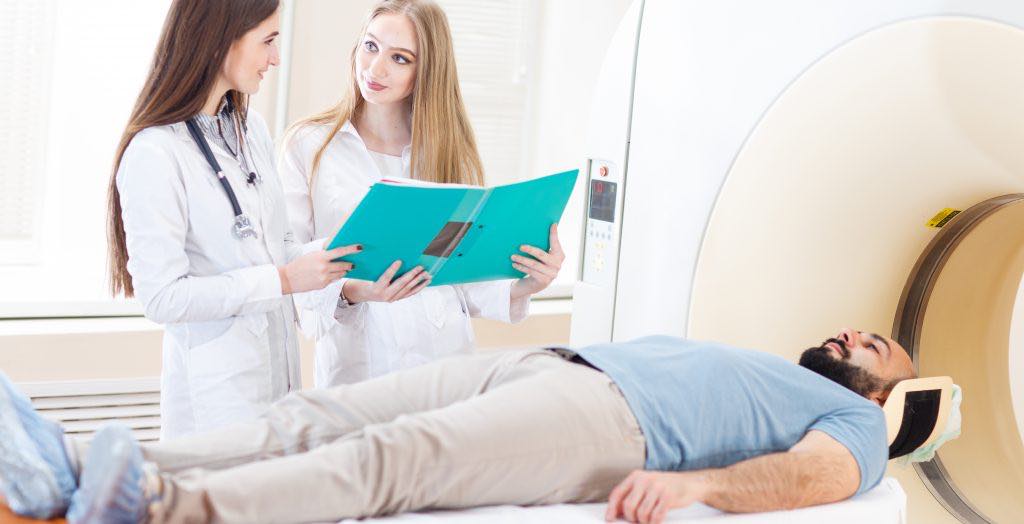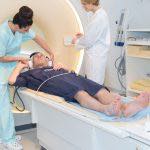Magnetic resonance imaging (MRI) is a diagnostic imaging test used to examine your internal organs and tissues. An MRI uses radio waves and a strong magnetic field to take detailed images of the body’s internal structures. Unlike x-rays and CT scans, MRIs do not use ionizing radiation. This imaging test is noninvasive and can provide your physician with clearer, more detailed images than other tests. Because of this, MRIs are a great tool to diagnose and monitor many medical conditions.
The length of your MRI will vary based on how many scans are needed for your specific situation. Your physician will be able to give you an estimate of how long the procedure will take. Here’s what to expect during your MRI recovery.
MRI recovery: Anesthesia and sedatives
MRIs are generally painless, so most adults do not need anesthesia or sedatives for the procedure. During an MRI, you will be asked to lay still while the machine takes images. If it is uncomfortable or painful for you to lay in one position, or if you suffer from claustrophobia or PTSD, your doctor may prescribe you mild sedative to help you relax. If you are prescribed a sedative for your scan, you will need to plan ahead to have someone drive you home after the procedure.
MRI recovery: Contrast materials
Your physician might recommend an MRI with contrast. Contrast dyes can either be ingested or injected through an IV. These dyes are generally safe drugs that cause certain blood vessels and tissues to show more clearly on the images taken during your scan. This allows the radiologist to see certain internal structures in more detail. The clarity of MRI images with contrast makes for easier diagnosis and monitoring of your condition. After your MRI, these contrast dyes will either be absorbed by your body or passed through your urine or bowel movements.
The most common contrast material used in MRIs is gadolinium. This dye temporarily changes the magnetic properties of the water molecules in your body, which helps increase the quality of the images taken during your MRI. Gadolinium can sometimes have rare but serious, side effects in patients with pre-existing severe kidney problems. You should discuss any kidney conditions with your doctor before scheduling an MRI with contrast. A blood test might be needed to make sure that an MRI with contrast is a safe option for your specific situation.
Side effects of the contrast material are rare but can include pain or burning at the injection site, skin rashes, headaches, low blood pressure, nausea, and lightheadedness. If experienced, these side effects are usually mild and temporary. Likewise, allergic reactions to contrast dyes are rare and usually mild. If you experience any pain or discomfort from the contrast materials, talk to the radiologist performing your MRI. They are well-equipped to deal with any adverse reactions.
MRI recovery: After your scan
MRIs are typically performed as outpatient procedures. In most cases, you will be able to leave the hospital or imaging center immediately after your scan. If you were prescribed a sedative for your MRI, you will need to avoid driving, operating heavy machinery, and drinking alcohol for 24 hours. Otherwise, you may resume your normal activities after your MRI.
If you had an MRI exam with contrast, you shouldn’t have any restrictions to your diet after your scan. However, your doctor might recommend a daily amount of water to help flush the dye from your system. Your doctor might recommend that you stop breastfeeding for a few days while the contrast materials leave your body.
After your scan, a radiologist will interpret the results of your MRI and share their findings with your physician. It may take up to two weeks for your physician to call you with your results. Your doctor will discuss with you the next steps that you should take for your specific situation. In some cases, a follow-up MRI might be necessary to further evaluate an abnormality or to examine a different part of your body. Follow-up exams might also be needed to monitor your condition over time and assess the success of any treatments.
The high price tag of an MRI, especially if you end up needing more than one, may seem daunting. Don’t let the cost of health care keep you from getting the imaging tests that you need. New Choice Health compares cost information across different hospitals and outpatient centers in your area, so you can find a fair price for your procedure. Walk into your MRI with confidence by using New Choice Health’s comparison tool to find the best price for your MRI.







